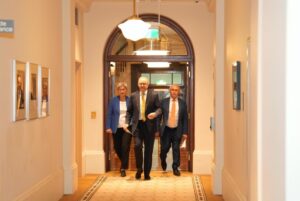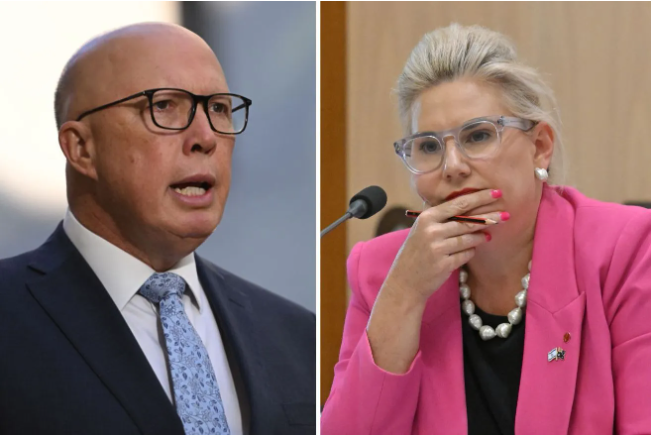Prime Minister Anthony Albanese has threatened to use “dispute resolution” powers in Australia’s free trade agreement with the United States, responding to President Donald Trump’s baseline 10 per cent tariff imposed on Australian exports to the US.
“The Australian
people have every right to view this action by the Trump administration as undermining our free and fair trading relationship,” Mr Albanese said.
“Our existing Free Trade Agreement with the United States contains dispute resolution mechanisms. We want to resolve this issue without resorting to using these.”
The ABC revealed yesterday that the Albanese government was preparing to take the US to the World Trade Organization to accuse it of breaching their trade agreement.
United States President Donald Trump has confirmed a new round of sweeping tariffs, setting a baseline on all trading nations including 10 per cent on Australian goods including beef.
The Trump administration is labelling the taxes as “reciprocal” measures in response to trade barriers — and earlier this week issued a grievance list that complained Australia’s biosecurity laws limited the United States from exporting fresh beef, pork and poultry products to Australia.
“We imported $[US]3 billion of Australian beef from them just last year alone. They won’t take any of our beef,” Mr Trump said in his ‘liberation day’ address.
“They don’t want it because they don’t want it to affect their farmers and, you know, I don’t blame them — but we’re doing the same thing right now, starting at midnight tonight, I would say.”

$1 billion in loans for exporters promised, emergency supports
Mr Albanese said Mr Trump’s decision today would have “consequences” for how Australia viewed its relationship with the US.
But he repeated he would not weaken Australia’s biosecurity laws or any other laws to escape the tariffs.
He also maintained Australia would not enter a “race to the bottom” by retaliating with its own tariffs.
Instead, Mr Albanese announced emergency funding support of $50 million for affected industries, a strengthening of anti-dumping rules to safeguard products like steel, a new “economic resilience program” offering $1 billion in zero-interest loans to help develop new export opportunities and a new focus on ensuring the government prioritises Australian businesses in its procurement.
“Our government will always stand up for Australian jobs, Australian industry, Australian consumers and Australian values,” he said.
Mr Albanese said “no one got a better deal” than Australia in Mr Trump’s ‘liberation day’ tariffs, and with just 5 per cent of Australia’s exports sent to the US, it would have a limited direct impact on the domestic economy.
“That doesn’t mean it’s a good thing,” he added.
Australia escapes most punishing tariff rates, but no exemption
Australia fared comparatively lightly in Mr Trump’s announcement, facing only the baseline 10 per cent tariff rather than heavier tariffs imposed on some nations.
But the government’s attempt to secure exemptions by arguing that the US maintained a trade surplus with Australia appears to have failed.
Opposition Leader Peter Dutton said the new tariffs were a negotiating position from the US, and Mr Albanese needed to meet with Mr Trump directly on them.
“There’s a lot of rhetoric and discussion but I think in the end what we need to do is sit down with the administration and negotiate,” Mr Dutton told radio station 2GB.
“There’s been no significant negotiation leader-to-leader. I think at the moment the prime minister is sort of flailing about on what to do and how to respond.”
Mr Trump imposed 20 per cent tariffs on Australian steel and aluminium last month, which the Coalition claims the government could have secured an exemption from as the Coalition did during the first Trump presidency.
However, Mr Trump has exempted far fewer countries this time around and from today, has imposed a tariff regime much greater than during his first administration.
Treasury has estimated that the direct impact of tariffs on Australia would be minor, causing a small dent to future economic growth, but says the indirect impacts of a global trade war would be of greater concern.
Last night, Mr Albanese dined with golfer Greg Norman, whose links to Mr Trump were instrumental to the former Coalition government catching the ear of the US president — a signal that the prime minister had not abandoned hope of a last-minute reprieve.



